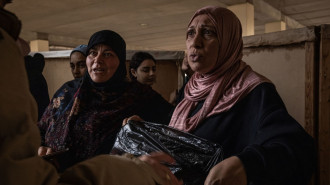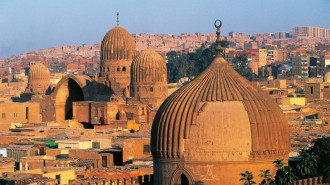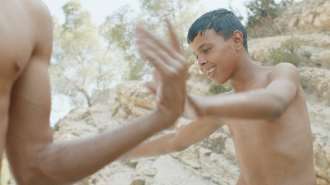
Partition at 75: As India and Pakistan commemorate independence, virtual reality reunites witnesses with their ancestral homes

If the past is a foreign country, do you need a visa? And whose to say that place remains?
Advances in virtual reality have helped realise half this hypothetical; harnessing technical sightlines to simulate geographies and stimulate memory.
The other half is left to decide whose story to tell. Enter Project Dastaan and its VR docu-drama, Child of Empire.
"Like the traditionally undivided Indian family which separates when brothers and cousins quarrel and build walls along the family courtyard, Indians and Pakistanis make awkward, complementary enemies"
Supported by Pakistan's Nobel Peace Laureate Malala Yousafzai and VICE Media co-founder Suroosh Alvi, Project Dastaan is a motherboard for the modern subcontinent: part repository, part creative studio, part social mission. Its aim: to reconnect those displaced during the 1947 Partition of India with their ancestral villages through virtual reality (VR).
Premiered at the 2022 Sundance Film Festival, Project Dastaan's flagship VR venture Child of Empire could not be more timely. This week, as India and Pakistan solemnly celebrate their 75th anniversaries, time is running out to consecrate the generation who participated in the largest forced migration in history.
Today, like the Indian Subcontinent itself, sentiments remain divided. But as the inimitable Eqbal Ahmed said 25 years ago, "Like the traditionally undivided Indian family which separates when brothers and cousins quarrel and build walls along the family courtyard, Indians and Pakistanis make awkward, complementary enemies."
The animation snuggly fits into this dialectic, proof that we feel and act in contrary ways when harbouring mixed emotions and divided feelings.
Child of Empire is vicariously narrated by two childhood friends; a Hindu who migrated from Pakistan to India, and a Muslim who migrated from India to Pakistan. Through cups of chai – one sweet, one not, both familiar – we learn of their perverse journey toward both statehood and refugee-ship.
Speaking to The New Arab at the British Film Institute (BFI), Project Dastaan (meaning story) co-founder Sparsh Ahuja spoke of how the initiative quickly evolved beyond reconnecting two of their founder's families with their ancestral homes.
"We wanted the piece to have a broader social impact. Child of Empire was inspired by the ordeals of my grandfathers during Partition, but their stories are two of a billion. We wanted the film to highlight that it is ordinary people who suffer the most when nationalism is created and torn apart."
And yet, paradoxically, it was this generation's transnational event, the COVID-19 pandemic, that stitched Project Dastaan's shawl to thread together the networks needed to make Child of Empire a success.
"Although COVID made travel impossible, it allowed us to explore new ways to bring the project into being," Sam Dalrymple, Project Dastaan's co-founder and operations lead told The New Arab. "Virtual reality became an achievable way to ensure these stories of trauma and longing are not lost."
For those of us interested in cybernetics, this shouldn't be a surprise. While the pandemic highlighted the worrying extent of the global digital divide, it also produced a wealth of cross-border creativity. Servers, social media accounts and video-sharing platforms are this generation's bazaars. Project Dastaan took full advantage of this migratory pattern.
"None of us had any background in virtual reality," Sam quipped. "We just posted an advert on the Facebook group 'VR Professionals UK' and met Erfan Saadati," who became Child of Empire's director.
Thankfully for Project Dastaan, this partnership would be fruitful. The award-winning director's imprint is visible throughout Child of Empire, seamlessly simulating themes of loss, tumult and psychosis directly into the viewer's headset. For the first time, thanks to Erfan, we're privy to our "tryst with destiny" in 3-D, with 360-degree hindsight.
It is this hindsight we must return to as we remember the 75th anniversary of Partition. One of the more pressing themes that emerged in The New Arab's conversation was the increasing scarcity of testimonies. The average life expectancy in India and Pakistan stands at 68 years; this is the last major anniversary we have to learn, first-hand, of the story that determined the region's present fate.
As Mohsin Hamid, author of The Reluctant Fundamentalist, said when speaking of Project Dastaan's significance: "I once asked my grandfather what the most important event of his lifetime had been. He didn't say World War Two or the Cold War or the development of the atomic bomb. He said 'Partition'. When I asked why he replied, 'Because two-thirds of my neighbours left and I never saw them again.'"
"While the Indian Subcontinent still feels the pain of Partition, Britain and its institutions have forgotten. Britain is a post-colonial nation. It is, and was, as much a part of the Raj as India and Pakistan, we mustn't forget that"
Given current geopolitical realities between the two nation-states, it's easy to forget that nationalism is anathema to the Indian Subcontinent. Our history and our nature contradict this relatively new ideology.
Initiatives like Project Dastaan help enshrine this seismic moment for posterity, ensuring that instances of conviviality between our people are fostered and that the forces of colonialism, the growth of the modern state structure, and the false promise of representative government are held to account.
The proof is in the pudding. All of the interviews by Project Dastaan were, necessarily, conducted with individuals aged between seven and 18. "The age range of participants revealed how a lot of the larger politics were absent from memory," Sam explained to The New Arab. "They didn't know what to do when they had to migrate. All they remember was their parents saying one day, 'we have to leave'."
|
|
"One of the more important aspects we wanted to convey in Child of Empire was that most interviewees couldn't justify any of the events. They weren't listening to the radio when Jinnah and Gandhi were speaking, they weren't party to the situation deteriorate." This has profound connotations.
Only after reuniting families with their ancestral homes do we learn how the mental cues obtained by Project Dastaan reveal an innocence that transcends the religious violence that came to dominate. "Due to their age, part of the challenge of reuniting families with their homes, particularly if they were from villages without major landmarks, was that all they remembered was sitting under 'the big tree', smelling the scent of the jasmine flowers, or playing in the field," Saadia Gardezi, co-founder and Pakistan-lead of Project Dastaan revealed to The New Arab.
And so since religious affiliation played little to no role in their quest, it leads us to challenge a factor yet to be mentioned: The British Empire.
|
In that regard, it's somewhat ironic that the interview between The New Arab and Project Dastaan was conducted at the British Film Institute.
As recalled by Sam, Cyril Radcliffe – tasked with drawing the line that split a continent in two – followed that 'job' with the restructuring of the BFI.
"What this shows is while the Indian Subcontinent still feels the pain of Partition, Britain and its institutions have forgotten. Britain is a post-colonial nation. It is, and was, as much a part of the Raj as India and Pakistan, we mustn't forget that."
Yet it's also a point of post-colonial pride that Project Dastaan is inherently a 'Brit-ish' initiative. The venture proves, by and large, that the British-Asian 'children of the empire' have resisted the artificial instincts that divided the Subcontinent into hostile enemies.
"We're at a point beyond representation. We create for ourselves now. It's no longer about assimilation, but our own legacy"
Only in a place like Britain can Indians, Pakistanis and Bengalis; Hindus, Muslims and Sikhs meet as the old friends we used to be, and only in these constructed, constructive states can we extend a branch of this olive tree to 'other' places afflicted by colonialism.
Project Dastaan and peace-building initiatives like it prove that artists are repositories no less than creators of collective memory and emotion.
And as Sparsh told The New Arab when asked to comment on the resurgence of British-Asian creativity: "We're at a point beyond representation. We create for ourselves now. It's no longer about assimilation, but our own legacy."
The scope for, and ambition of Project Dastaan remain vast. There are plans to extend the initiative to the school curriculum in the UK, and Project Dastaan will be travelling to India and Pakistan with Child of Empire in November of this year.
There's no getting around that the environment there will be tenser, but it's something that needs to be done.
As Saadia concluded: "There's something to say about cross-national activism, about creating art which forges common ground and common memories.
"At The New Arab, your focus is the Middle East and North Africa, you have been affected in ways that speak to us, and vice versa. Together we can find stories that link us in a perennial way. The idea of losing one's home speaks across empires. What we want to do at Project Dastaan is feel this emotion to foster empathy."
Benjamin Ashraf is The New Arab's Deputy Features Editor. He is also a Visiting Research Fellow at the University of Jordan's Center for Strategic Studies.
Follow him on Twitter: @ashrafzeneca
![Child of Empire is directly inspired by real life accounts of three Partition witnesses from both sides of the border [photo credit: Project Dastaan]](/sites/default/files/styles/medium_16_9/public/2022-08/image_009_0003.jpg?h=33fbb5bc&itok=iIk995Wm)
![Reconnecting Bahdur Ali Phambra to his old village via WhatsApp [photo credit: Project Dastaan]](https://www.newarab.com/themes/custom/new_arab/images/DefaultImage.jpg)
![Palestinians mourned the victims of an Israeli strike on Deir al-Balah [Getty]](/sites/default/files/styles/image_684x385/public/2024-11/GettyImages-2182362043.jpg?h=199d8c1f&itok=xSHZFbmc)


![The law could be enforced against teachers without prior notice [Getty]](/sites/default/files/styles/image_684x385/public/2178740715.jpeg?h=a5f2f23a&itok=hnqrCS4x)
 Follow the Middle East's top stories in English at The New Arab on Google News
Follow the Middle East's top stories in English at The New Arab on Google News


